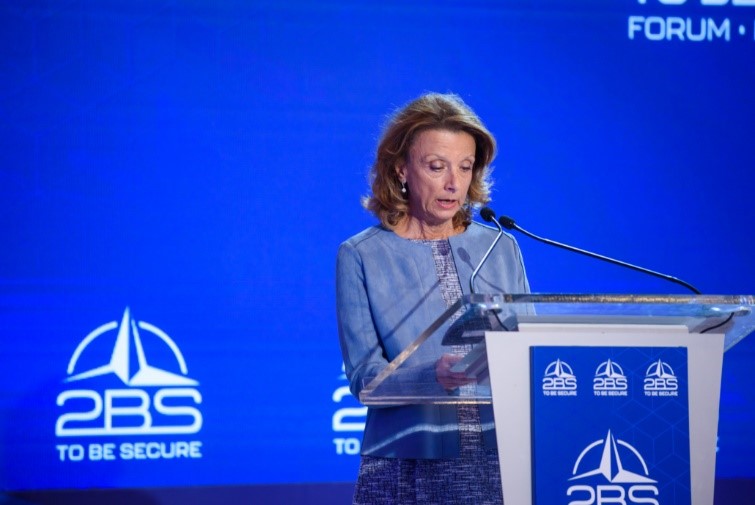In the year when Montenegro marks its 5th anniversary of NATO membership, the 12th 2BS Forum was officially opened by Milica Pejanović-Đurišić, the Chairwoman of the Governance Board of the Atlantic Council of Montenegro. In her speech, Professor Pejanović-Đurišić stated that during the past years, the Forum has become a relevant platform that initiates and encourages political and security discussions in Southeast Europe.
By combining the participants’ rich theoretical and practical experiences at the Forum, we tried to contribute to the search for answers to the most current questions and challenges in the fields of security and international relations. At the same time, the Forum is a place where new initiatives, partnerships, and ideas are exchanged between representatives of governments, businesses, the academic community, research centers, and the media. More than three and a half thousand participants so far represent a significant contribution of the Forum in the direction of creating conditions for the stability of the Region, as well as for participation in global efforts of this kind – she emphasized, opening the 2BS Forum.
Last year’s 2BS Forum, said Pejanović-Đurišić, despite visible indications of tectonic changes in international relations, ended with optimism and conviction that we can overcome the expected challenges and obstacles.
She said that everything is happening in conditions that, especially in the last two decades, are burdened by fundamental changes in the world economy: from the digital transformation that changes the established balance of international relations to the financial crisis that has shown the shortcomings and vulnerabilities of the liberal value system.
In such an already quite chaotic environment, the Russian invasion of Ukraine represents a turning point for overall political and security relations, the international economy, and the global energy system, with effects that cannot be limited to one region or contained within the geographical borders of one country. The far-reaching consequences of this new type of hybrid war that we are witnessing include numerous elements, among which are: a severe humanitarian crisis, cyber-attacks, and economic difficulties, as well as disinformation and propaganda campaigns, geopolitical tensions over energy supply, with the latent, but the increasingly serious threat of nuclear war, Pejanović-Đurišić pointed out.
Acting from the position of subverting the international order while insisting on a sphere of influence in its neighborhood and effectively limiting the sovereignty of neighboring countries, Russia is looking for justification for aggression in the wrong addresses, demonizing the West, NATO, the USA, Pejanović-Đurišić underlined.
In such an approach, which is entirely inconsistent with reality, Russia lost sight of the readiness of the Ukrainian people to defend their homeland, especially solidarity at the global level in defense of freedom and democratic values. The strengthening of the trans-Atlantic alliance is precisely one of the most significant international reactions to the Ukrainian crisis. NATO is expanding, its members are unique in their relationship with Russia, and resources are increasing, which turned the argument about Russia’s threat from NATO into its opposite. Montenegro and its partners strongly support Ukraine, sympathizing with the victims and destruction to which the Ukrainian people are exposed. I believe that the citizens of Ukraine have no dilemma in this regard and that this is precisely the reason why President Zelensky readily accepted our initiative to participate in this year’s Forum, for which we owe him exceptional gratitude, she said.
The former minister of defense said that the reflections of the aggression against Ukraine are very clearly visible in the entire Western Balkans region, where Russia, with a very extensive network of its proxies, continues destructive activities aimed at destabilization and endangering the stability and security of the region. Clero-nationalist and big-state ideologues and structures striving to return the region to the 90s are also motivated. The narrative that calls into question democratic rights, human rights, and freedoms has found a strong foothold in our region, with a significant impact on the political dynamics characterized by political instability, with the strengthening of mutual antagonisms with the potential to endanger the already fragile peace and stability in the region.
At the same time, the lack of democratic capacities and weak institutions, as well as the lack of focus of Western partners, facilitated the access of actors who, through destabilizing the Western Balkan region, want to threaten the EU and NATO further. Montenegro is the most obvious example, where efforts are being made to create a social environment in which the civic concept, secularism, and anti-fascist values on which the modern Montenegrin state rests will be questioned, all to question the viability of Montenegro as the state, Pejanović-Đurišić added.
Professor Pejanović-Đurišić expressed concern that the country that was the most realistic candidate to become the next member of the E.U. and that for decades played the role of a factor of stability in the region, in such a short period has become deeply polarized and is in a severe political and institutional crisis.
Organized crime, corruption, deep-rooted partitocratic approach in the state administration, the presence of actors who, at the expense of other countries, strive to make Montenegro a part of the Serbian… Russian… another world… all this contributed to creating an environment in which a crisis of this scale was even possible. In addition to the fact that after gaining independence, we were not sufficiently committed to strengthening democracy and institutions in the country, the responsibility for the current situation lies primarily with the political elites who did not cope with the conditions of the political transition after the 2020 elections. Thus, issues such as reforms that are a prerequisite for the EU membership, inflation, energy crisis, and climate change have been neglected, so negative reports on progress in E.U. accession are not a surprise, she warned.
